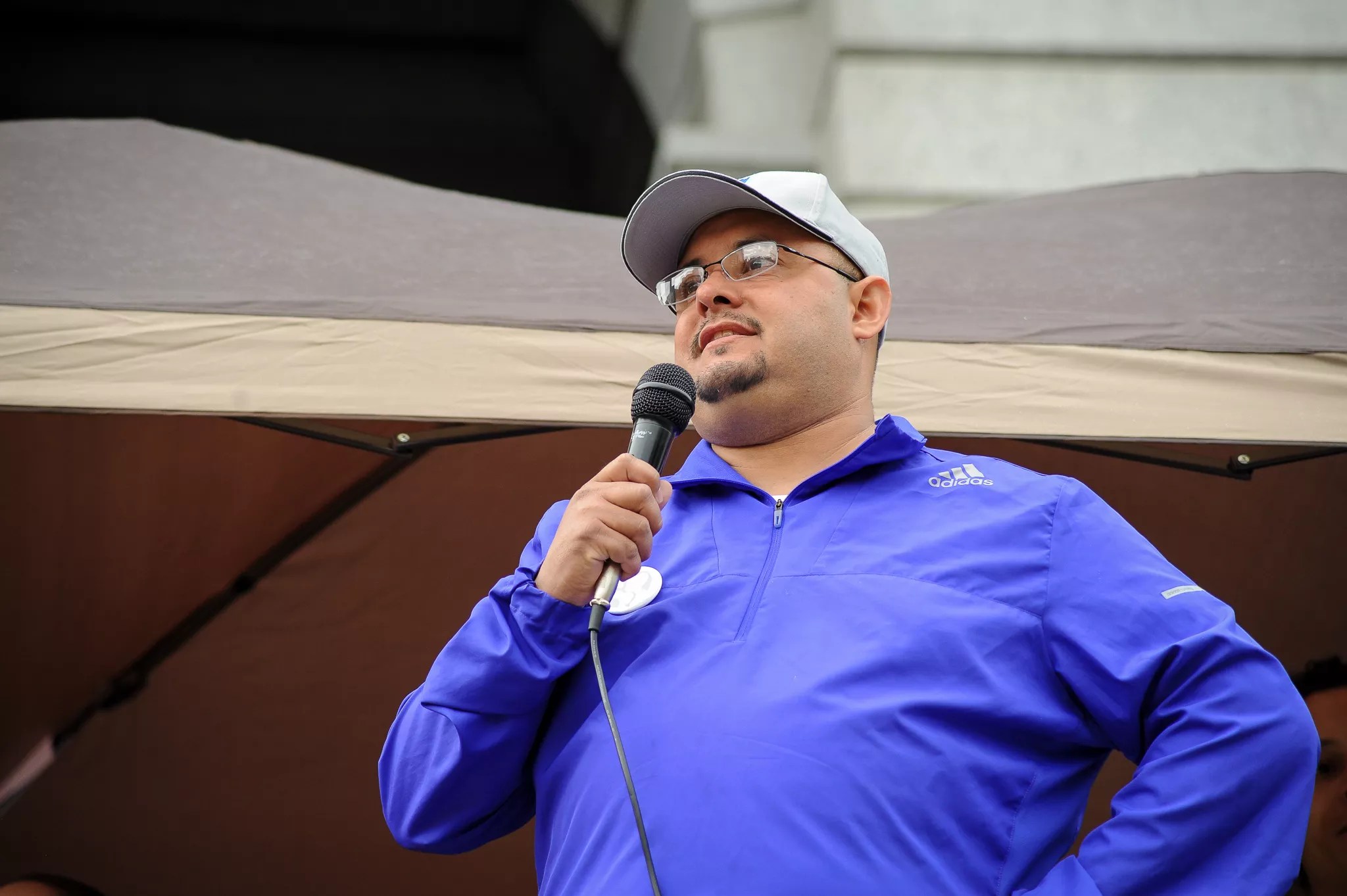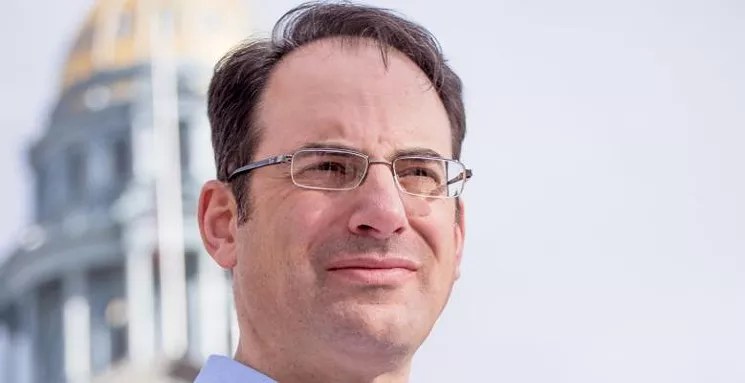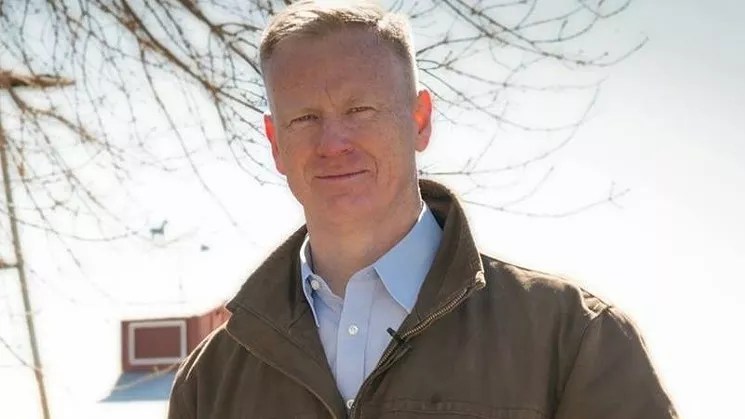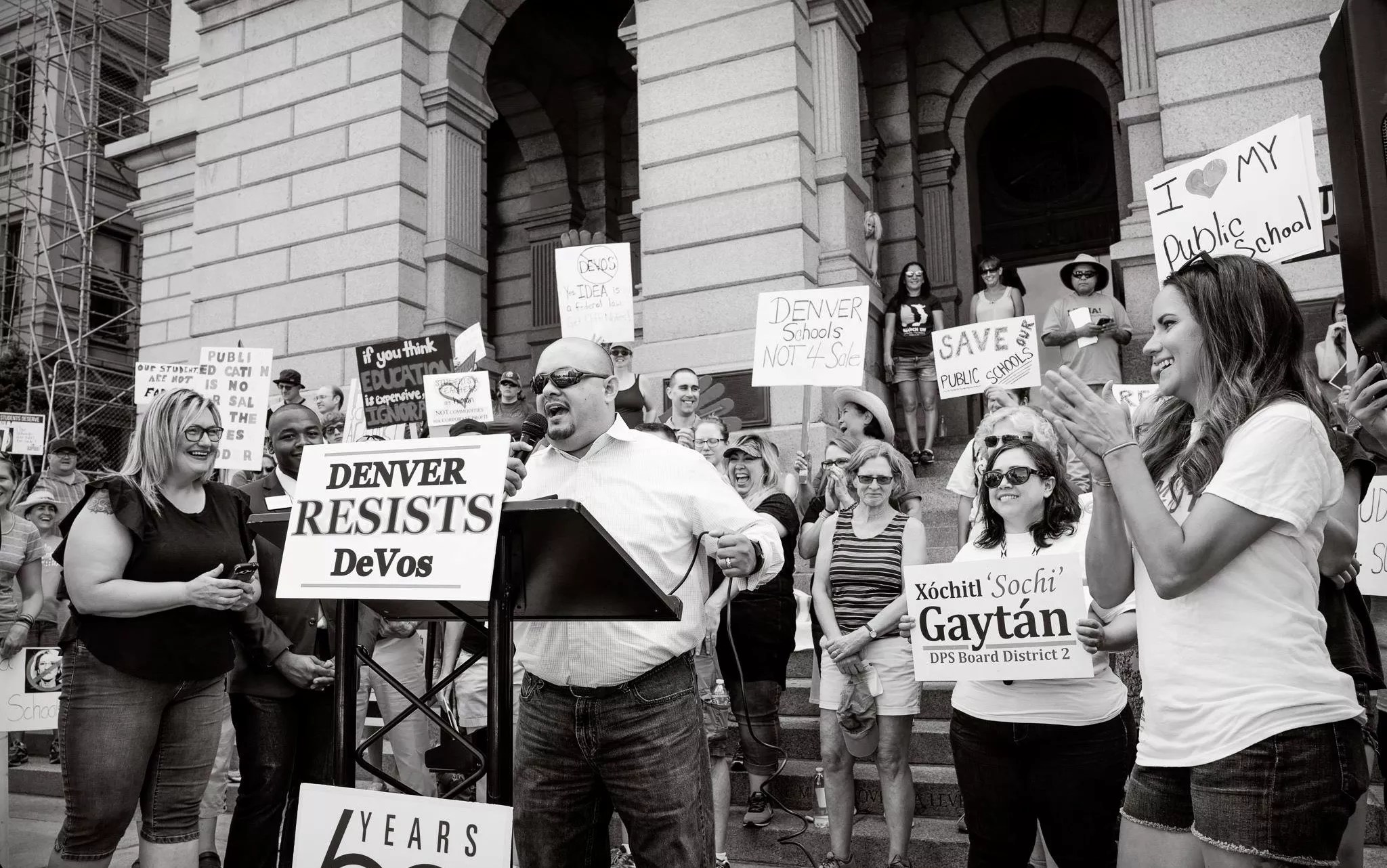
Erin McCarley

Audio By Carbonatix
True to his “street fighter” persona, Colorado Representative Joseph Salazar ran one of the most competitive primary campaigns this election cycle. But after losing the Democratic attorney general race by a fraction of a percentage point, Salazar will be transitioning back to civilian life. He says he doesn’t plan on eyeing any elected offices for a while. Instead, he wants to focus on his civil rights law practice and return to what he loves most: community advocacy.
Salazar is working on a memoir that could serve as a progressive manifesto for those seeking to engage politically and campaign for office. Years of working with centrist Democrats in the House who consistently worked against progressive legislation, such as the homeless Right to Rest bill, has solidified his belief that the party needs to clean house, he says, and send more progressives to the State Capitol to wrest control away from establishment politicians. He expects to complete his memoir by October.
In the meantime, Salazar sat down with Westword to talk about his election loss, vent about state and party politics, and share how civilian life has been treating him.
Westword: What were your thoughts on election night when you saw the results rolling in? When we spoke before the primaries, you said the most recent polling available showed you ahead of Phil Weiser by double digits. Did you expect the race to turn out like it did?
Joseph Salazar: In our first interview, I think I said that it was going to happen one of two ways. Either I was going to blow him out or it was going to be very close. So it worked out the second way. A week before the election, it was my understanding that a poll was run and I was twelve points ahead of Phil, which would have been a blowout. The week before election day was when Governor John Hickenlooper came out and endorsed Phil, which I think resulted in that lead shrinking.
Some people have also said that a lot of your lead and early momentum in the campaign had nothing to do with you, and instead had everything to do with the Salazar name. You and former Colorado attorney general and Democratic kingmaker Ken Salazar are distant cousins. Do you believe the “name confusion” issue boosted your campaign?
No, I think people were able to distinguish between the Anadarko Salazar and the civil rights Salazar. [Former U.S. senator and Secretary of the Interior Ken Salazar is an attorney whose clients include Anadarko Petroleum, and Joe Salazar is a civil rights attorney.] Let’s think about it. I had been campaigning for over a year, and they tried to use that same argument against me at the beginning of the race that, “Oh, they’re confusing you with Ken.” But every poll had me in the lead. They had a whole year to try and distinguish me from Ken if, indeed, voters were confused, and I still ended up being ahead in all the polls. The reason why I stayed ahead is because people know me apart from knowing Ken. There’s a reason why progressives vote my way. There’s a reason why unaffiliated voters vote my way, too, and it’s because they know I’m not Ken. I don’t think that holds much water at all. And I think this is just a pot-shot way of saying, “Joe Salazar, you’re really not a big name in politics. It was really Ken’s name.” I think that’s a very lazy argument. It was just a petty way of saying the only reason why you’re in a statewide race is because of a name that a former Salazar had built without recognizing that, well, I did a pretty good job building my brand, a brand that a lot of Coloradans like.
Some folks, including Westword, have been critical of you not conceding the race to your opponent Phil Weiser until four days after the primaries. Why did you wait so long before recognizing defeat?
Because we didn’t know anything about this election. It was the first open primary ever in the history of the state of Colorado. What we saw with each data dump starting on the day after of the election, I was gaining ground on Phil. It wasn’t until Saturday that we knew we didn’t have enough runway. We were going to give every single voter the opportunity to have their votes counted, so for anybody to issue any type of criticism whatsoever when even the party and Phil agreed that we should wait, that criticism is ill-founded.
At the close of election night, I was behind 12,000 votes, and I told everyone, “Just hold on. We still have unaffiliated voters, working families and people of color who primarily vote on election day and primarily vote very late. We’re going to see a different day tomorrow.” Sure enough, by three, four o’clock in the morning, I had closed his lead by 5,000 votes. Every single new result that came out from the Colorado Secretary of State, I continued to gain ground on him. Never lost ground at all with every single new data dump from the Secretary of State’s Office. I gained to the point where I closed it from 7,800. I think it was the day after the election to a week later, I was ultimately behind by 4,819 votes, so it was a good indicator that progressives, unaffiliated voters and people of color broke my way.

Democratic nominee Phil Weiser is running against George Brauchler in the November attorney general race.
Phil Weiser
What were the major issues that you think motivated people to vote in the attorney general race?
I think what attorneys general are doing across the country and are doing against the Trump administration was a factor in it. I think our own Colorado issues played a major role in why so many people came out to vote – from the Taxpayer’s Bill of Rights to education funding, Colorado water and our environment. That all played out well in the primary. Not only that, we had two really good attorney general candidates. I think there was excitement.
Do you think because your primary race was so contentious – this was probably the most competitive race in June – it will negatively impact Weiser in the general election?
No, because I’m a good leader. I’m a really good general on the battlefield, and when I ask my supporters to switch over and start fighting for Phil, they’ve responded. They realize the bigger picture of what a George Brauchler attorney general would do, so, yeah, Phil has been extremely gracious in reaching out to me because he knows that I represent 49.6 percent of the voters [who voted Democrat]. Not only that, he’s a good guy. My job is to make sure my supporters vote for Phil, nearly 600,000 combined votes in the Democratic attorney general primary. That’s a lot of votes.
You’ve lined up behind Weiser in his general election run against Brauchler. How are you supporting his campaign?
I’m not going to give the inside baseball on how I’m supporting Phil, but people should know that I’ve been out there fighting for him. In fact, we got into a pretty good one last night [on Twitter]. George can’t seem to keep away from a Brauchler-Salazar fight to save his soul, and so I’m out there making sure people know about Phil, elect him and know the hazards of electing a George Brauchler for attorney general.
Fracking has been a big issue, particularly in the Democratic attorney general race. I think it’s fair to say that your stance on fracking garnered you a lot of progressive support as opposed to Weiser’s more centrist position and his major backing by Ken Salazar.
The Anadarko Salazar.
Exactly. So how are you making that argument to your supporters that they should support Weiser now when he hasn’t taken a clear stance on fracking, like you have?
I’ve had conversations with Phil about Initiative 97 [the oil and gas setback ballot petition], about communities he is unaware of. He lives in the Lowry-Stapleton area; it’s currently not being fracked. So there are a lot of things he doesn’t know. So I’ve sat down with him and educated him about what’s happening in north Thornton, my district, and I think he has a better understanding now. I haven’t seen him shift his position yet, but he has a greater understanding now than he ever has. I’m hoping as we move forward and Initiative 97 makes the ballot, he’ll have a clear policy position on the issue.

George Brauchler, district attorney for the 18th Judicial District, is the Republican candidate for attorney general this year.
Are you going to continue serving in the legislature?
No, I’m done.
So what’s going to happen with your Thornton district, House District 31?
I have someone running in the district. Her name is Yadira Caraveo; she’s a medical doctor who grew up in the district. She comes from an immigrant family. Her family immigrated undocumented. She was born here, and she went to school in the district, graduated from medical school, went to the University of New Mexico to do her residency and came back to the district. She’s a pediatrician in the district she was raised in. My district is going to be in really good hands.
She’s in a three-way race against Eric Montoya, a Thornton City Council member and an unaffiliated candidate backed by United Colorado, and Republican candidate Rico Figueroa, who lost his bid for Adams 12 Five Star school board and lost his Colorado Supreme Court lawsuit over the election. Is there concern he will be a spoiler and that the district will flip red this time given how tight your last two re-elections have been?
There is a concern that it might go Republican because of what he’s doing, but he’s a really bad candidate. I think people will see right through that.
Now that you’re wrapping up your final year at the Colorado General Assembly, are you considering a move elsewhere politically? Is there a future for you in the Senate, despite the fact it would be at least four years, since your Senate district is on the ballot this cycle?
I will never serve in the Colorado General Assembly again, so help me God. I am done with the General Assembly. It is the most sophisticated high school I’ve been to, and I don’t want to go back to that. I keep my options open. That’s one thing I’ve always done. I’ll return back to community. I’ve already been asked to sit on two boards.
Those are strong words about the Colorado General Assembly. Is it cliquish or – ?
It’s all of that. It’s cliquish, childlike. I saw some conduct while I was there that I was like, are you kidding me? We’re talking about 5.6 million people, and this is the most important thing on your agenda because your feelings were hurt.

Joe Salazar at an education rally outside the Capitol.
Joe Salazar
Like what?
Like Paul Rosenthal and his votes against the homeless Right to Rest bill. I mean, his constituents basically begged him to make sure he got that bill out of committee, but he killed that bill year after year. His constituents were like, “We’re done with you.”
Why?
That’s a good question. Maybe developers got a hold of him. Maybe Denver Mayor Michael Hancock got a hold of him. We know that he organized a meeting with Hancock and Denver representatives to stand against the homeless Right to Rest bill. Representative Jovan Melton and I met with Hancock personally in his office telling him, “You stop interfering.”
What were some of your other disappointments at the legislature, which has led you to not want to serve in the Statehouse again?
The treatment of American Indians. The bills I brought were really good bills for the American Indian community, and it was Democrats that killed those damn bills. Some of them, anyway. The battles I had with Democrats, like on the mascot bill, literally on-the-floor yelling matches because they were like, “This is going to hurt my community.” Oh, I’m sorry for the, like, 500-plus years of oppression that American Indians have suffered. You’re worried about your House district. There’s this insular way of thinking about issues that have a wide-ranging socio-political effect on communities of color. I thought to myself, there’s got to be something better than this. There’s got to be a better way than having to squabble over the oppression of American Indians with this white representative who is more worried about her House seat than doing the right thing. That’s what irritated me, and that’s why I very likely won’t return to the General Assembly again.
Do you think it’s an issue inherent to the party itself? Would you run as an independent if you were to return?
I know that’s really strong language, but that’s how strongly I feel about some members of the General Assembly. I think that there are more cowards than leaders.
I think that’s a really fair question. Maybe some people would be like, “Absolutely not, I’m a Democrat for life.” But it is a fair question. It really depends on which direction the party starts going in the next couple of years. I have a lot of faith in Morgan Carroll, chair of the Colorado Democratic Party, and I’m definitely going to give Morgan the benefit of the doubt in terms of making those huge adjustments that we need. If the party doesn’t make those huge adjustments, if it stays a bunch of neo-liberals who are beholden to corporate interests, yeah, I would consider leaving, because they’re no longer a party for the people.
It loos like the Colorado Democratic Party is taking more progressive stances. When party members met in Elbert County earlier this year, they voted to back Initiative 97 to require 2,500-foot setbacks for oil and gas developments. For a party that has produced pro-business, centrist candidates like Governor John Hickenlooper, Mayor Hancock, Ken Salazar and others, is that a drastic move for it to take?
No, because the party participants want to go in a certain direction. We’ve been seeing it for years. When you take a look at the party platform, where we stand on LGBTQ rights and things of that nature, they have been on our party platform forever, but you couldn’t get the elected representatives and senators to move in that direction. That’s the problem. I think the party platform is in a good position. It’s these cowards we’re electing who don’t want to go in that direction of the party platform.
I know that’s really strong language, but that’s how strongly I feel about some members of the General Assembly. I think that there are more cowards than leaders. As I put it in one Facebook post, we do a really good job dressing cowards as leaders. And I think Hickenlooper plays into that. I think that he feeds that whole policy belief that you have to be centrist, that you have to be moderate, that you have to basically sell people out. He comes from quite the position of privilege, and he doesn’t realize what’s happening on the ground floor. I think that’s a shame. I think people like Hickenlooper, people like Anadarko Salazar, are going to be written out of history, because we are tired of that kind of politician.
Ken Salazar doesn’t come from privilege.
No, he doesn’t come from privilege. He grew up in the San Luis Valley. He grew up extremely poor. He worked really hard, because when you work on a farm and ranch, you learn how to work hard. He’s gotten to his position scraping through and through. It’s when he gets to his position that defines your characteristics as a human being. What he’s decided to do is he’s decided to sell out our environment, the very environment that he fought for as a farmer and rancher, by the way. He sold it out for larger dollars, and I think that’s what people are disgusted about when it comes to Ken.
When we last spoke, you also mentioned your memoir and how the attorney general race might impact the direction you take with it. How’s the book coming along, and when are you finishing it?
I finished a number of chapters. I’m getting the book proposal done and off to an agent. It’ll probably take me until September, I imagine, September or October, to finish it up, but I’m having fun with it. Oh, my God, it’s such a cathartic event for me because I’m able to pour onto these pages everything that I’ve experienced being an indigenous Democratic representative in the state of Colorado.
What’s the premise of the book?
It’s a progressive manifesto. It’s talking about why we have to move in this direction. The things that I experienced as an elected representative with these moderates who are destroying any advancement on social justice issues, criminal justice issues and economic justice, and how people are starting to rise up. We have Indivisible, Our Revolution and Democratic Socialists of America. I mean we have so many groups that are rising up against the moderate Democrats, and what this memoir talks about is, how did I do it? How did I go from this Chicano student activist from the University of Colorado Boulder to rising up to be a pretty influential state representative running for statewide office on $150,000 when we got to 49.6 percent? How does that happen? And the point being is we have to grow our own. That’s how it happens.
Is this a way to get more, say, Alexandria Ocasio-Cortez-like figures in state and local government?
Absolutely. We have to grow our own. We have so many amazing community leaders out there who never think of themselves as being a senator or representative. We have four individuals right now who are running who have been at the tip of the spear when it comes to being community activists. Julie Gonzales, I mean, my goodness, how many times did we have to talk to her about running for the Senate? Finally, she decided to do it.
We have Robert Rodriguez. We have Serena Gonzales-Gutierrez. And we have Rochelle Galindo, I mean, my goodness, an LGBTQ Latina running in conservative Greeley. Our communities are growing, and we are growing these individuals. They are now moving on to the next steps.
This interview was edited for clarity and length.